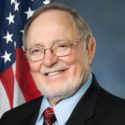Alaskan Congressional Representative Don Young has been on the side of statehood for Puerto Rico for decades. Alaska joined the Union in 1959, so Rep. Young has a better understanding than most of what it means to be a territory.
Young was one of the election observers for the 2017 plebiscite, when 97% of voters chose statehood over the other status options possible under the U.S. constitution.
“I was pleased to be an observer in this election,” he said. “It was one of the best elections I’ve ever witnessed. Very fail-safe, fair and well operated. It made me feel good about the process.”
Congressman Young wasn’t shy about expressing his views on Puerto Rico’s status. “It is time we stop colonizing Puerto Rico,” he said. “It’s time that we recognize 3.5 million Puerto Rican citizens of America. It’s time that the Congress steps up and does their job – to take and make them a state as they have spoken.”
Young went on to talk about his own experience in the Territory of Alaska. “We were the 49th state and I heard the same arguments then. ‘Why should we?’ ‘They’re a long ways away.’ They forgot we were American citizens as Puerto Ricans are American citizens,” Young recalled. “I’m saying it’s time for Congress to act and to make Puerto Rico – as the people sought to do so – a state; the 51st state of this union.”
In the video below, Congressman Steny Hoyer thanks Young as he says, “Let’s make this the last colony. Let’s make this the 51st state.”
Young spoke out the previous year when he chaired the hearings on Puerto Rico’s debt crisis. “We would not have this problem if Congress followed my advice to make Puerto Rico a state 15 years ago,” he insisted. “We have neglected Puerto Rico for over 100 years; a territory that should be a state. I say shame on us.”
The reference to 15 years previous to the 2016 hearing was about the United States-Puerto Rico Political Status Act, a bill for which Young was the senior sponsor. This bill was intended to allow Puerto Rico to choose its political status by referendum. HR 856 passed in the House but failed in the Senate.
The bill faced a variety of arguments in Congress, including attempts by Luis Gutierrez to add several amendments:
- To make Spanish the official language of the state of Puerto Rico
- To say that Congress “recognizes that Puerto Rico is sociologically and culturally a Caribbean and Latin-American nation with a distinctive culture that has Spanish as a common language”
- To delete all mention of the Treaty of Paris
- To exempt Puerto Rico from federal taxes until the income on the Island equals that of the next poorest state
- To allow Puerto Ricans living in and born in the states to vote in the referendum
All these amendments failed.
There was lively discussion of possible definitions of “commonwealth,” and then Resident Commissioner Carlos Romero-Barcelo said of the “commonwealth” party’s definition of the commonwealth option that it “would not be acceptable to Congress. So therefore, to submit a proposal, as such, to the people of Puerto Rico, would be unfair to the people of Puerto Rico. It would be mischievous to the people of Puerto Rico… And to have it in a bill offering it to the people of Puerto Rico would be fooling the people of Puerto Rico.”
Puerto Rico went on to hold a referendum in 1998, with “None of the Above” winning the vote. In his report on the vote to Congress, Young explained that the “commonwealth” party, rather than accepting the territorial option, “officially adopted and advocated an alternative commonwealth definition that did not appear on the ballot and contained principles rejected on a bipartisan basis by the Committee on Resources during consideration of H.R. 856.” He concluded that it was not possible to determine what status the voters of Puerto Rico had chosen in the 1998 plebiscite.
Congress ignored it. Rep. Young recalled the words of Romero-Barcelo, expressing his disappointment that the voters of Puerto Rico had been tricked into wasting their votes.
In 2007, Young introduced another bill to resolve the status question. He said, “My goal here is to really try to allow Puerto Rico to advance. And I do not believe you can advance as a commonwealth. I say that from my heart. Because we [Alaska] were not able to advance as a commonwealth. We were a territory. And my goal is to listen to the Puerto Rican people, listen to witnesses like we have today. But my ultimate goal is to try to give the Puerto Rican people a choice. And my bill, H.R. 900, does give them a choice. And if they decide to be an independent nation, God bless you. If you decide to be a state, God bless you. If you decide to be a commonwealth, you are not going to grow.”
Congressman Young was correct in that statement. As a resident of a former territory, Rep. Young is aware of the problems territories face, and the powerlessness of a territory in comparison with a state. Help us thank Rep. Young for his support by clicking the tweet below.
Thank you, @RepDonYoung, for supporting statehood for Puerto Rico. #PR51st Click To Tweet







No responses yet